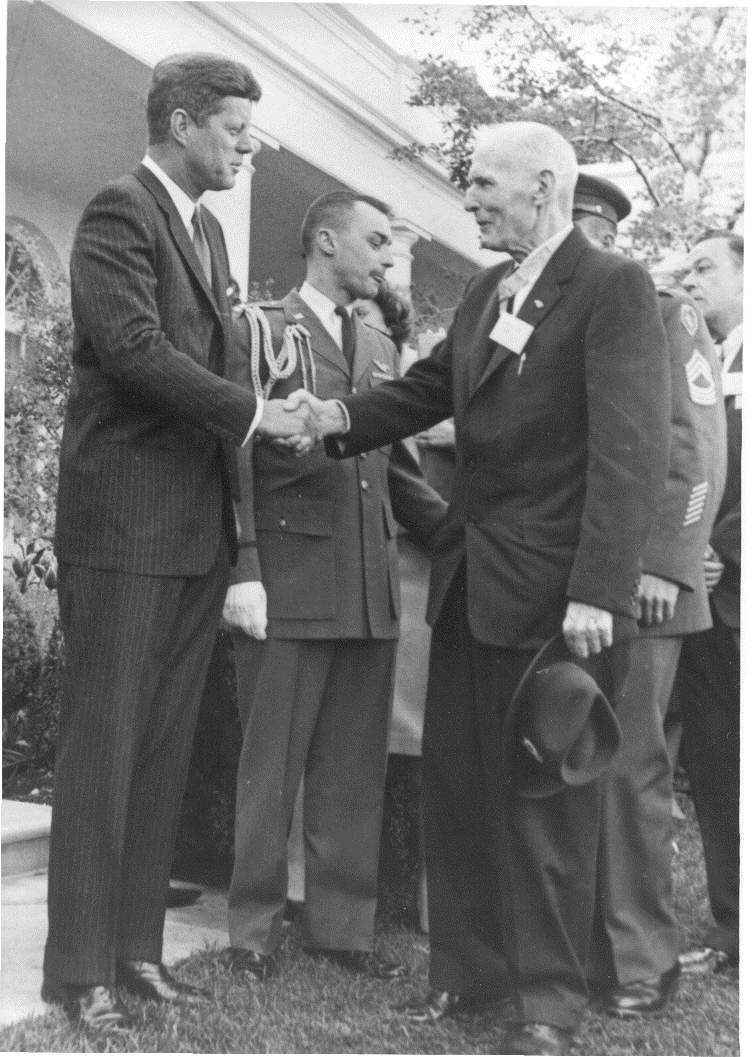Tonight my daughter invited me to take advantage of her educator’s discount at a Scholastic Books sale.
I was looking for books I might read especially to younger grades but didn’t find quite what I was looking for. Instead I bought three books that appealed to me as an adult and as a historian. As I came home with them I wondered if I could paste them together in a little bedtime history lesson for my older grandson. It was asking something of a seven-year old to listen to history when he was looking forward to the latest Diary of a Wimpy Kid but he told me he liked history and gave me permission to be pedantic.
I took him into my office and showed him the picture I’d told him about a few weeks ago when he was astonished to learn that my grandfather had shaken hands with a President of the United States.

I told him the lesson would be about Lincoln. But first I told him how my grandfather had been an officer for an infantry division in which all the privates were black soldiers from New York. Then I told him that my Grandfather had grown up in rural Salina, Kansas on a farm where his nearest neighbor was an escaped slave. I even remembered his name, Larry Lapsley.
I told Tanner how Lapsley had escaped slavery by traveling on foot from Texas to Kansas and even scared a mountain lion almost as much at it scared him on his journey. With that I showed him a book by Norman Rockewell’s grandson, You’re a Grand Old Flag.

It placed the text of that patriotic song with his grandfather’s magazine covers. One of the last covers was of Lincoln who Tanner immediately recognized. I told him how Lincoln, pictured reading the Gettysburg Address, had traveled to Louisiana on a raft as a young man and saw slaves being auctioned off.
Then while Tanner brushed his teeth before further instruction I sang It’s a Grand Old Flag to him.
After that I showed him a book called Unspoken about the Underground Railroad.

Tanner knew exactly what it was to my delight. The book was without words and showed a young girl on a farm with a patterned quilt draped over a log fence. Tanner knew the significance of quilts too with the hints their patters gave escapees of where to ride the railroad. The girl goes to her barn as slave hunters travel past her farm. She senses someone hiding behind shocks of corn in her vegetable shed. She says not a word but she is nervous as she goes about her work. After supper, she brings some handkerchiefs out to the vegetable shed. On the next page hands open the cloth and remove bread and meat. She returns to the shed the next day as the slavers once again cross her farm empty handed. There she finds a corn husk doll which in the last frame she takes to bed. With a little prompting Tanner saw the story unfold.
Finally I showed him the last book Abe Lincoln’s Dream with illustrations he had been the most interested in.
First, I told my grandson what my Mother told me when I complained I was ugly. She simply told me that Lincoln was homely. When I told him I had decided there and then I didn’t care what I looked like Tanner was quick to say in some surprise that yes, it was more important how you were inside.
Next I told Tanner about how my Grandfather’s father, Thomas Robb, had come to America as a twelve-year-old in December of 1860 when a boat departing New York City shouted to his incoming ship that South Carolina had seceded from the United States. I told Tanner that the secession took place because Lincoln had been elected President. I explained how Lincoln fought a war to keep the United States together and how he told jokes to lesson his sorrow at the war’s death and destruction. I told him how the President had been murdered because of the war and this was a surprise to Tanner. Finally, I read the book about how Abe’s ghost is found fretting over the fate of the nation by a small girl who was separated from her tour group.
Abe tells her some lame jokes and walks through a wall explaining that Ghosts are terrible at telling lies because you can see through them. He tells her of the dream he had the night before his murder of riding on a dark sea to an unseen destination. She takes him by the hand and shows him an America that has changed for the better since 1865. He sees comforting sights the last of them being the stars and stripes on the Moon which astonishes him. Coincidentally, one of the Rockwell magazine covers in It’s a Grand Old Flag had been of the space module on the moon. It was published on the front cover of Look Magazine in 1967 two years before any American landed on the Moon. Tanner recognized it from the book I’d read earlier.
With that my lesson was ended. I read a few pages of the Wimp out loud. They were about how the Wimpy diarist’s Dad got caught with his pants down. After that got a guffaw from Tanner I handed him the book to finish on his own.
I’m pleased to say Lincoln held his own with the father whose pants were around his ankles.
